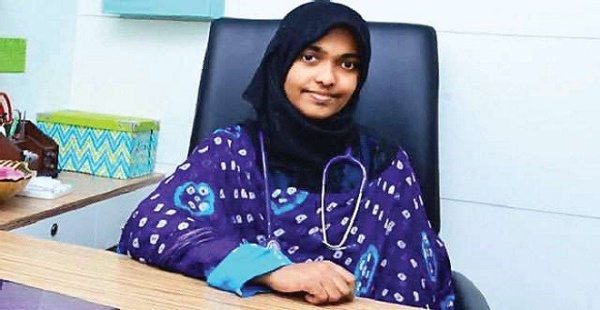The Supreme Court on Thursday upheld the validity of the marriage of Hadiya , a 26-year-old Kerala woman who converted to Islam and wed a Muslim man, overturning a Kerala high court order that annulled their marital union as a sham.
"Hadiya alias Akhila Asokan is at liberty to pursue her future endeavours according to law," a three-judge bench led by Chief Justice Dipak Misra ruled, reading out the operative part of its judgement. A reasoned order will follow later, the bench said.
Pronouncing the landmark decision that upholds a woman's right to choose her partner, the bench - also comprising justices AM Khanwilkar and DY Chandrachud -- said the Kerala high court "should not have annulled the marriage" of Hadiya and Shafin Jahan while exercising the extraordinary powers it derives from the Constitution of India to enforce fundamental rights.
Hadiya, born Akhila, converted to Islam in January 2016 and married Jahan in December the same year. In May 2017, the Kerala high court annulled the marriage.
Thursday's order came on a petition by Jahan challenging the high court order, which was delivered on a habeas corpus petition filed by Hadiya's father KM Asokan. The top court rejected the father's plea that it was well within the high court's power to declare a marriage sham if there was evidence to back it.
The high court not only invalidated Hadiya's marriage but also handed the woman's custody to her parents. The order had put the spotlight on "love jihad", a controversial term coined by fringe Hindu groups to describe what they claim is a conspiracy by Muslim men to lure Hindu women into marriage.
The Supreme Court relied on its November 27, 2017 interaction with Hadiya when the latter was present in the court. It noted that Hadiya had "admitted" to her marriage with Jahan.
After the interaction Hadiya was freed from her father's custody and sent to her college to complete the homeopathy course she was pursuing.
Reacting to the Supreme Court verdict, Asokan said he will continue his fight. He said he will soon file a review petition against the order after consulting his lawyers.
"I still believe that the marriage was a haphazard one and an excuse to take her abroad," he said.
"Look, no father would like to send his daughter to the violence-hit areas of Afghanistan or Syria. I am an atheist and I don't believe in any God. I would be the happiest if my daughter would have converted and married a Muslim youth in a proper way," he said, adding he still believe that Jahan has some nexus with fundamentalist elements.
On a probe of the case by the National Investigation Agency (NIA), the Supreme Court clarified that the anti-terror agency "may continue" its work in respect of any matter of criminality "in accordance with law." This means the NIA cannot enquire into the legality of the marriage but can look into the allegations of terror links, if any.
It was the Supreme Court which in August last year ordered the NIA to probe the case. A bench headed by the then chief justice of India JS Khehar had issued the directive. Justices Khanwilkar and Chandrachud were members of the bench.
But in January this year, the bench headed by CJI Misra said the NIA cannot probe the legitimacy of the marriage. It even refused to peruse the report NIA had prepare in which it claimed that the alleged conversion and marriage of Hadiya to a Muslim man was not an isolated incident and there was a pattern of such marriages emerging in Kerala.
Earlier in the day, during the arguments, the bench cautioned against stepping into the realm of public law. "Marriage and personal relations are the core of plurality of India. We must do everything to protect it," the bench said, responding to senior advocate Shyam Divan's argument that the peculiar facts of Hadiya's case justified the HC order.
Divan, appearing for Asokan, said public law has evolved to account for situations where a marriage may be intended to defeat a state interest or even a private interest. He argued that the expanding concept of law now takes into account the question of marriage fraud.
Justice Chandrachud differed and said courts could annul marriages, but the power should be exercised only in exceptional circumstances where it is established that one of the parties was incapable of asserting free will. This would include cases of minors being forced to get married to elderly men or cases of trafficking.
Intervening, additional solicitor general Maninder Singh, appearing for the NIA, sought to stress that "marriage" in the case "was a disguise to further an offence".
Opinion | Hadiya has the right to love and marry whoever she wants
"This marriage was a ploy to get her out of court proceedings", Singh said, narrating the sequence of events leading to the HC order. He implored the bench to take a look at NIA's status report.
The government is free to take action in case of a criminal act but a "good or bad marriage" cannot be annulled, the court told Singh.
Senior advocate Kapil Sibal, who appeared for petitioner Jahan, rubbished the NIA's arguments.

Comments